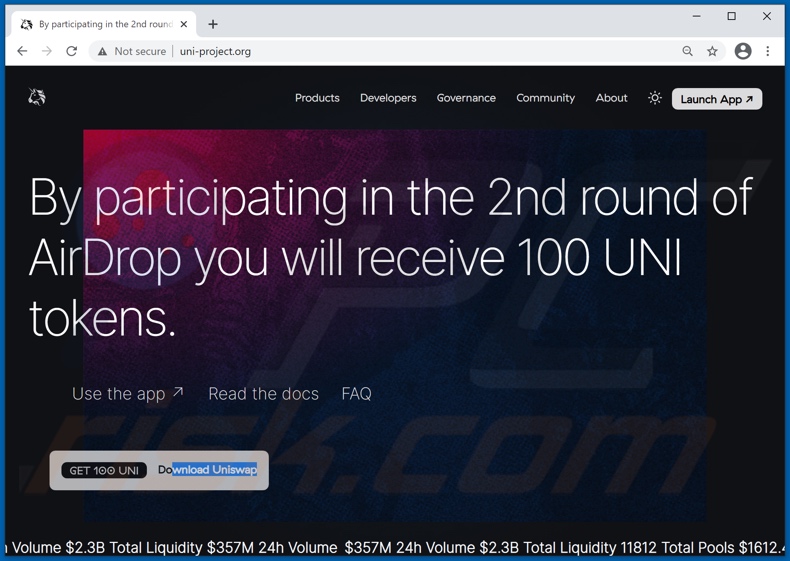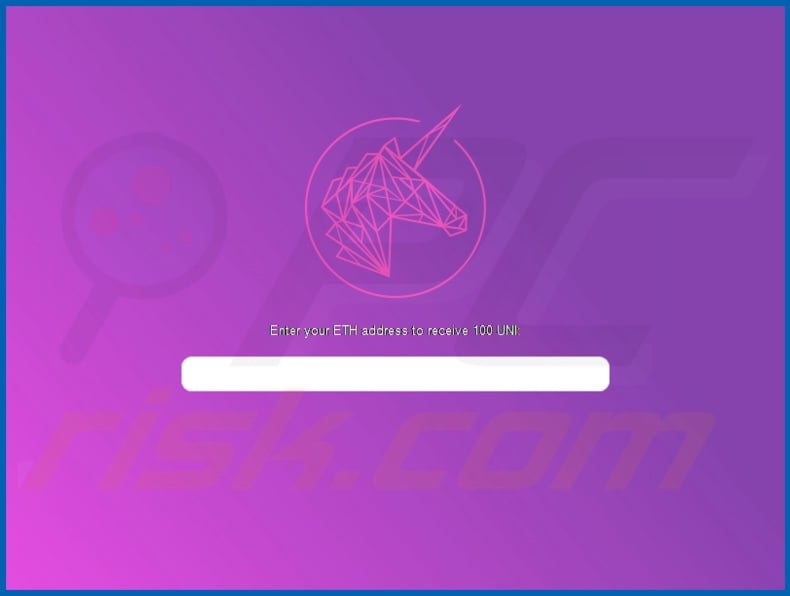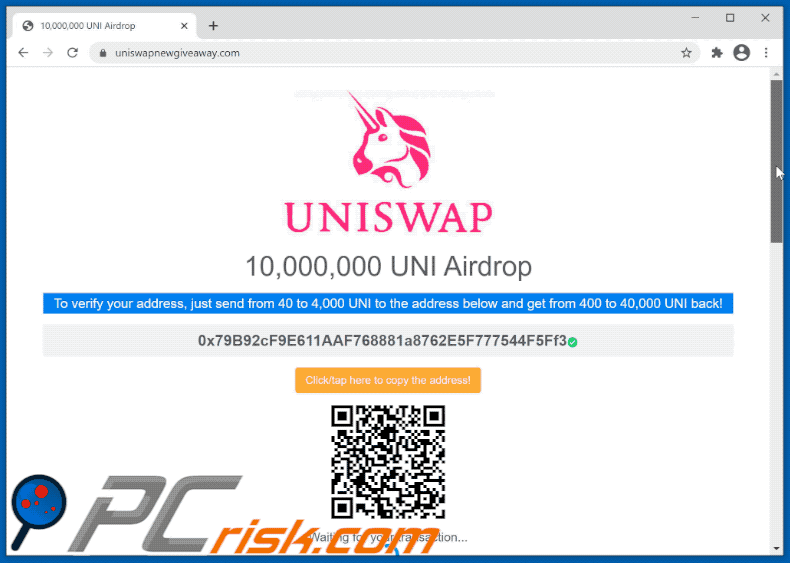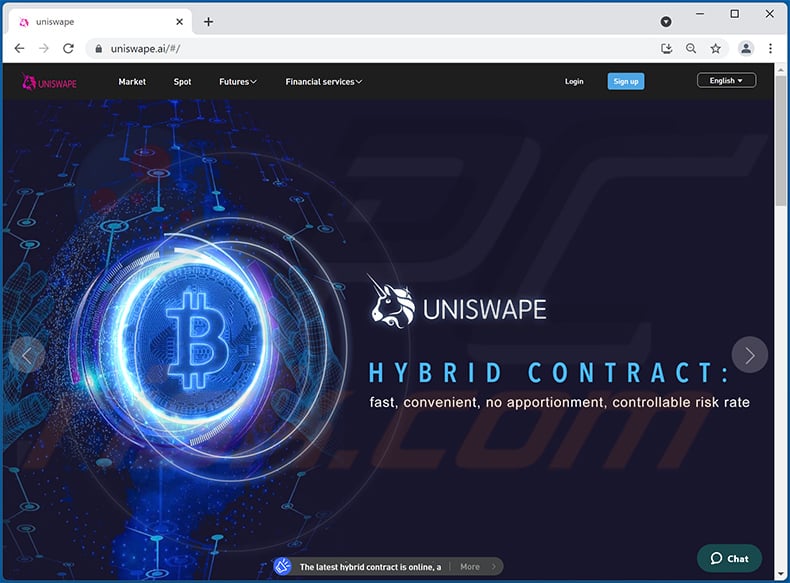Avoid infecting your system with malware through "Uniswap Giveaway"
Phishing/ScamAlso Known As: RedLine Stealer malware
Get free scan and check if your device is infected.
Remove it nowTo use full-featured product, you have to purchase a license for Combo Cleaner. Seven days free trial available. Combo Cleaner is owned and operated by RCS LT, the parent company of PCRisk.com.
What is "Uniswap Giveaway"?
"Uniswap Giveaway" is a scam promoted on various deceptive sites. Uniswap is a decentralized cryptocurrency exchange for automated transactions between cryptocurrency tokens. The scheme in question is presented as a promotion of the second AirDrop round of Uniswap. By participating, users can supposedly receive 100 UNI tokens.
Note that this giveaway scam is in no way associated with the genuine Uniswap - the scheme's goal is to urge users into downloading/installing a fake Uniswap application, which is in fact RedLine Stealer malware.
These deceptive/scam websites are typically accessed unintentionally - most users enter them via mistyped URLs, redirects caused by intrusive advertisements, or installed Potentially Unwanted Applications (PUAs).

"Uniswap Giveaway" scam overview
The "Uniswap Giveaway" scam urges users to download/install its application to participate in the second AirDrop round. Since legitimate product/project promotions have occurred, scammers often use the model for nefarious purposes.
In the case of the "Uniswap Giveaway" scheme, people are promised 100 UNI tokens for their participation. At the current exchange rate, this sum of UNI tokens is valued at nearly three thousand US dollars (note, rates constantly fluctuate). Instead of receiving the tokens, however, victims download/install the RedLine Stealer, malicious software designed to extract sensitive and private information from infected systems.
This malware can obtain data from certain browsers, FTP (File Transfer Protocol), and IM (Instant Messaging) applications. Information of interest includes (but is not limited to): account log-in credentials (i.e., IDs, usernames, and passwords), internet cookies, autofill data, banking account and credit card details, etc. RedLine also collects system data, and it can exfiltrate content (e.g., files) stored on the compromised device.
Furthermore, this malicious program can cause chain infections. I.e., it can download/install additional malware (e.g., trojans, ransomware, cryptominers, etc.). Therefore, the potential threats posed by this malware far exceed those presented by its information-stealing capabilities.
To summarize, by trusting the "Uniswap Giveaway" scam, users can experience multiple system infections, severe privacy issues, financial losses, and identity theft. Removal instructions for RedLine Stealer malware can be found in the corresponding article.
Potentially unwanted applications are usually behind rogue redirects to misleading, deceptive, and malicious sites (e.g., those running the "Uniswap Giveaway" scam), however, these apps can have other/additional dangerous functionalities.
Adware-types run intrusive advertisement campaigns. Other types called browser hijackers operate by modifying browsers to promote fake search engines. Furthermore, regardless of type, most PUAs can track data. They monitor browsing activity (browsing and search engine histories) and collect sensitive data inferred from it (IP addresses, geolocations, and even personally identifiable information). The gathered data is then monetized by sharing with and/or selling to third-parties (potentially, cyber criminals).
To ensure device integrity and user privacy, eliminate all suspicious applications and browser extensions/plug-ins immediately upon detection.
| Name | RedLine Stealer malware |
| Threat Type | Phishing, Scam, Social Engineering, Fraud |
| Fake Claim | Scam claims that users will receive 100 UNI tokens for participation. |
| Payload | RedLine Stealer |
| Detection Names (payload) | ESET-NOD32 (A Variant Of MSIL/TrojanDownloader.Agent.H), Ikarus (Trojan-Downloader.MSIL.Agent), Malwarebytes (Trojan.PCrypt.MSIL.Generic), Sangfor Engine Zero (Trojan.Win32.Save.a), Full List Of Detections (VirusTotal) |
| Related Domains | uni-project[.]org, uniswap-x2[.]com, uniswapnewgiveaway[.]com, uniswape[.]ai, trustcoin[.]top, claim-uniswapstoken-gateway[.]org, uniswaps-airdrop-verify01a[.]org |
| Serving IP Address (uni-project[.]org) | 209.99.16.65 |
| Symptoms | Trojans are designed to stealthily infiltrate the victim's computer and remain silent, and thus no particular symptoms are clearly visible on an infected machine. |
| Distribution methods | Compromised websites, rogue online pop-up ads, potentially unwanted applications. |
| Damage | Loss of sensitive private information, monetary loss, identity theft, possible malware infections. |
| Malware Removal (Windows) |
To eliminate possible malware infections, scan your computer with legitimate antivirus software. Our security researchers recommend using Combo Cleaner. Download Combo CleanerTo use full-featured product, you have to purchase a license for Combo Cleaner. 7 days free trial available. Combo Cleaner is owned and operated by RCS LT, the parent company of PCRisk.com. |
Giveaway-type scam examples
"Doge Giveaway", "Double Your Bitcoins", "Gift card giveaway", "BTC giveaway", and "Binance giveaway" are some examples of other scams using the giveaway model. There are thousands of deceptive websites on the web. They use a broad range of different techniques to gain and subsequently abuse users' trust.
Popular scam types are: "amazing" offers and deals, fake prize raffles, warnings that the device is infected or at risk, alerts that an essential software product is outdated or missing, and so on. Regardless of what these schemes claim, offer, promise, request, or demand, the end-goal is the same: to generate revenue at users' expense.
Due to the widespread nature of these online scams, exercise caution when browsing.
How did potentially unwanted applications install on my computer?
PUAs are distributed via download/installation set-ups of other products. This deceptive marketing tactic of packing regular software with unwanted or malicious additions is called "bundling".
Rushing download/installation processes (e.g. ignoring terms, skipping steps and settings, etc.) increases the risk of inadvertently allowing bundled content into the system.
Some PUAs have "official" download sites. Intrusive advertisements proliferate these applications as well. Once clicked, they can execute scripts to download/install PUAs without users' consent.
How to avoid installation of potentially unwanted applications
You are advised to research all software before download/installation or purchase. All downloads must be done from official and verified sources, since dubious channels such as unofficial and free file-hosting websites, Peer-to-Peer sharing networks and other third party downloaders commonly offer deceptive or bundled content.
When downloading/installing, read the terms, explore all possible options, use the "Custom/Advanced" settings and opt-out of supplementary apps, tools, features, etc. Intrusive ads may seem normal and harmless, however, they can redirect to various dubious web pages (e.g. gambling, pornography, adult-dating, and many others).
If you encounter ads or redirects of this kind, inspect the system and remove any suspicious applications and browser extensions/plug-ins immediately.
If your computer is already infected with PUAs, we recommend running a scan with Combo Cleaner Antivirus for Windows to automatically eliminate them.
Text presented in the "Uniswap Giveaway" scam:
Products Developers Governance Community About Launch App
By participating in the 2nd round of AirDrop you will receive 100 UNI tokens.
Use the app
Read the docs
FAQ
GET 100 UNI
Download Uniswap
Screenshot of the fake Uniswap application, which is used to disguise RedLine Stealer malware:

Yet another deceptive website (uniswapnewgiveaway[.]com) promoting Uniswap giveaway scam:

Text presented within this site:
10,000,000 UNI Airdrop
To verify your address, just send from 40 to 4,000 UNI to the address below and get from 400 to 40,000 UNI back!
0x79B92cF9E611AAF768881a8762E5F777544F5Ff3
Click/tap here to copy the address!
Waiting for your transaction...
1. To make a transaction, you can use any wallet or exchange that supports UNI.
2. Send a small amount you want multiplied by the promotion from your wallet. For example, to get 2000 UNI, send 200 UNI. You can use any wallet or exchange of choice to send UNI.
3. Once we receive your identifying transaction, we will immediately send the requested amount back to you.
Still waiting for transaction? Click HERE!
Every participant who is late gets their UNI immediately sent back - you won't lose anything.
UNI remaining:
6 327 630 / 10 000 000
Transactions
Transactions for address: 0x79B92cF9E611AAF768881a8762E5F777544F5Ff3
Screenshot of a fake Uniswap trading platform website (uniswape[.]ai) used for phishing and scam purposes:

Another Uniswap giveaway-themed scam website (uniswap-x2[.]com):
![Uniswap giveaway scam website (uniswap-x2[.]com)](/images/stories/screenshots202301/uniswap-giveaway-scam-update-2023-01-06-another-variant.jpg)
An example of Uniswap (UNI) giveaway-themed drainer website (trustcoin[.]top):
![Uniswap (UNI) giveaway-themed drainer website (trustcoin[.]top)](/images/stories/screenshots202405/uniswap-giveaway-scam-update-2024-05-06-another-variant.jpg)
Another example of Uniswap (UNI) giveaway-themed drainer website (claim-uniswapstoken-gateway[.]org):
![Uniswap (UNI) giveaway-themed drainer website (claim-uniswapstoken-gateway[.]org)](/images/stories/screenshots202409/uniswap-giveaway-scam-update-2024-09-18-another-variant.jpg)
Instant automatic malware removal:
Manual threat removal might be a lengthy and complicated process that requires advanced IT skills. Combo Cleaner is a professional automatic malware removal tool that is recommended to get rid of malware. Download it by clicking the button below:
DOWNLOAD Combo CleanerBy downloading any software listed on this website you agree to our Privacy Policy and Terms of Use. To use full-featured product, you have to purchase a license for Combo Cleaner. 7 days free trial available. Combo Cleaner is owned and operated by RCS LT, the parent company of PCRisk.com.
Quick menu:
- What is RedLine Stealer malware?
- How to identify a pop-up scam?
- How do pop-up scams work?
- How to remove fake pop-ups?
- How to prevent fake pop-ups?
- What to do if you fell for a pop-up scam?
How to identify a pop-up scam?
Pop-up windows with various fake messages are a common type of lures cybercriminals use. They collect sensitive personal data, trick Internet users into calling fake tech support numbers, subscribe to useless online services, invest in shady cryptocurrency schemes, etc.
While in the majority of cases these pop-ups don't infect users' devices with malware, they can cause direct monetary loss or could result in identity theft.
Cybercriminals strive to create their rogue pop-up windows to look trustworthy, however, scams typically have the following characteristics:
- Spelling mistakes and non-professional images - Closely inspect the information displayed in a pop-up. Spelling mistakes and unprofessional images could be a sign of a scam.
- Sense of urgency - Countdown timer with a couple of minutes on it, asking you to enter your personal information or subscribe to some online service.
- Statements that you won something - If you haven't participated in a lottery, online competition, etc., and you see a pop-up window stating that you won.
- Computer or mobile device scan - A pop-up window that scans your device and informs of detected issues - is undoubtedly a scam; webpages cannot perform such actions.
- Exclusivity - Pop-up windows stating that only you are given secret access to a financial scheme that can quickly make you rich.
Example of a pop-up scam:

How do pop-up scams work?
Cybercriminals and deceptive marketers usually use various advertising networks, search engine poisoning techniques, and shady websites to generate traffic to their pop-ups. Users land on their online lures after clicking on fake download buttons, using a torrent website, or simply clicking on an Internet search engine result.
Based on users' location and device information, they are presented with a scam pop-up. Lures presented in such pop-ups range from get-rich-quick schemes to fake virus scans.
How to remove fake pop-ups?
In most cases, pop-up scams do not infect users' devices with malware. If you encountered a scam pop-up, simply closing it should be enough. In some cases scam, pop-ups may be hard to close; in such cases - close your Internet browser and restart it.
In extremely rare cases, you might need to reset your Internet browser. For this, use our instructions explaining how to reset Internet browser settings.
How to prevent fake pop-ups?
To prevent seeing pop-up scams, you should visit only reputable websites. Torrent, Crack, free online movie streaming, YouTube video download, and other websites of similar reputation commonly redirect Internet users to pop-up scams.
To minimize the risk of encountering pop-up scams, you should keep your Internet browsers up-to-date and use reputable anti-malware application. For this purpose, we recommend Combo Cleaner Antivirus for Windows.
What to do if you fell for a pop-up scam?
This depends on the type of scam that you fell for. Most commonly, pop-up scams try to trick users into sending money, giving away personal information, or giving access to one's device.
- If you sent money to scammers: You should contact your financial institution and explain that you were scammed. If informed promptly, there's a chance to get your money back.
- If you gave away your personal information: You should change your passwords and enable two-factor authentication in all online services that you use. Visit Federal Trade Commission to report identity theft and get personalized recovery steps.
- If you let scammers connect to your device: You should scan your computer with reputable anti-malware (we recommend Combo Cleaner Antivirus for Windows) - cyber criminals could have planted trojans, keyloggers, and other malware, don't use your computer until removing possible threats.
- Help other Internet users: report Internet scams to Federal Trade Commission.
Frequently Asked Questions (FAQ)
What is a pop-up scam?
Pop-up scams are deceptive messages designed to lure users into performing certain actions, e.g., downloading/installing software, purchasing products, calling fake support lines, disclosing private information, making monetary transactions, etc.
What is the purpose of a pop-up scam?
The aim of pop-up scams is to generate revenue. Cyber criminals primarily profit by obtaining funds through deception, abusing or selling sensitive data, promoting content, and proliferating malware.
Why do I encounter fake pop-ups?
Pop-up scams are run on various deceptive websites. Most users enter these pages through redirects caused by sites that use rogue advertising networks, mistyped URLs, spam browser notifications, intrusive ads, or installed adware.
Will Combo Cleaner protect me from pop-up scams?
Combo Cleaner is designed to detect and eliminate threats. This includes scanning visited sites and detecting deceptive/malicious ones. Additionally, it can restrict all further access to such webpages. Combo Cleaner can also remove unwanted software and practically all known malware infections. Keep in mind that since sophisticated malicious software usually hides deep within systems - running a complete system scan is essential.
Share:

Tomas Meskauskas
Expert security researcher, professional malware analyst
I am passionate about computer security and technology. I have an experience of over 10 years working in various companies related to computer technical issue solving and Internet security. I have been working as an author and editor for pcrisk.com since 2010. Follow me on Twitter and LinkedIn to stay informed about the latest online security threats.
PCrisk security portal is brought by a company RCS LT.
Joined forces of security researchers help educate computer users about the latest online security threats. More information about the company RCS LT.
Our malware removal guides are free. However, if you want to support us you can send us a donation.
DonatePCrisk security portal is brought by a company RCS LT.
Joined forces of security researchers help educate computer users about the latest online security threats. More information about the company RCS LT.
Our malware removal guides are free. However, if you want to support us you can send us a donation.
Donate
▼ Show Discussion